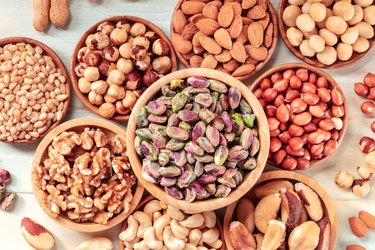
Tree nuts, such as almonds and cashews, are among the most common food allergies, according to Food Allergy Research & Education. But even if you don't have an allergy, you could still experience stomach pain after eating nuts, along with acid reflux or indigestion.
Though nuts are overall a nutritious food, the high fat content can mean they take longer to digest and lead to symptoms like indigestion or acid reflux, according to Alan Baptist, MD, associate professor and director of the Allergy and Immunology fellowship training program and the Asthma program at the University of Michigan in Ann Arbor.
Video of the Day
Video of the Day
"What we see is that most people actually have an intolerance and not a true allergy," Dr. Baptist says. While an intolerance doesn't mean you need to stop eating nuts, severe symptoms, such as hives or difficulty breathing, could be a sign of a more serious food allergy, according to the U.S. National Library of Medicine.
Read more: Can Eating Nuts Give You Heartburn?
Indigestion vs. Acid Reflux
So what exactly is that unpleasant feeling in your stomach? Whether it's indigestion or acid reflux, the high fat content in nuts could be contributing to it.
Indigestion, or upset stomach, is a painful or burning feeling in the upper abdomen. Additional symptoms of indigestion, according to the National Institute of Diabetes and Digestive and Kidney Diseases (NIDDK), include bloating, belching or passing gas and nausea. Causes of indigestion are numerous and include:
- Stress
- Certain medications or medical conditions
- Eating too much
- Smoking
- Drinking alcohol or caffeinated beverages
In the case of cashews and almonds, the high fat content, sometimes difficult to digest, could be the culprit.
As Dr. Baptist points out, acid reflux, also known as heartburn — or gastroesophageal reflux disease (GERD) when it occurs frequently — is another symptom that some feel after eating cashews and almonds. Heartburn occurs when the muscle that normally keeps acid in the stomach relaxes or weakens, letting stomach acid flow back up into the esophagus, the tube that connects the mouth to the stomach, according to the Mayo Clinic.
This backflow can cause irritation and discomfort in the chest. Because the body takes longer to digest the fats in tree nuts, food sits in the stomach longer, making a larger window of opportunity for acid reflux and that burning sensation to occur.
To ensure symptoms are being caused by nuts and not by other foods or conditions, Dr. Baptist encourages his patients to spot patterns by keeping a food diary to track what they eat and the symptoms they feel.
Is It An Allergy or Intolerance?
Although indigestion or acid reflux can be uncomfortable, they're usually signs of an intolerance and not an allergy.
A true allergy, Dr. Baptist says, occurs when the body has made an antibody against a food substance by mistake. This can cause specific symptoms like breaking out into hives, lip swelling, throat tightness, difficulty breathing and severe nausea or vomiting. In the case of these symptoms, Dr. Baptist says to stop eating the food and get help right away.
Read more: Can You All of a Sudden Be Allergic to Nuts?
Nuts Are Packed With Healthy Fats
Almonds and cashews — and other nuts — have a high fat content, but most of their fats are the "healthy" fats: monounsaturated and polyunsaturated fats. These fats are beneficial because they are linked to healthier cholesterol, less inflammation and more stable heart rhythms, according to the Harvard T.H. Chan School of Public Health.
For example, one serving of almonds (1/4 cup) contains 14 grams of fat, 95 percent of which is healthy fat, per the Harvard T.H. Chan School of Public Health. And the fat in one serving of cashews is about 80 percent healthy fat, according to Harvard Health Publishing.
While foods high in fat can lead to indigestion or acid reflux, because of the health benefits of nuts, Dr. Baptist doesn't recommend cutting them out completely, even if you have an intolerance.
Instead, he says, continue to eat nuts in small quantities, or find a way to replace healthy fats through additional diet sources or vitamins and supplements. You can find non-nut sources of healthy fats in avocados, seeds and fish, according to the Harvard T.H. Chan School of Public Health.
- Food Allergy Research & Education (FARE): “Tree Nut Allergy”
- Alan Baptist, MD, specialist, allergy and immunology, internal medicine; associate professor; director, Allergy and Immunology fellowship training program and Asthma program, University of Michigan, Ann Arbor
- U.S. National Library of Medicine: “Food Allergy”
- National Institute of Diabetes and Digestive and Kidney Diseases: “Symptoms & Causes of Indigestion”
- Mayo Clinic: “Heartburn”
- Harvard T.H. Chan School of Public Health: “Types of Fat”
- Harvard T.H. Chan School of Public Health: “Almonds”
- Harvard Medical School: “Cashews: A Better Choice Than Low-Fat Chips?”
Is this an emergency? If you are experiencing serious medical symptoms, please see the National Library of Medicine’s list of signs you need emergency medical attention or call 911.